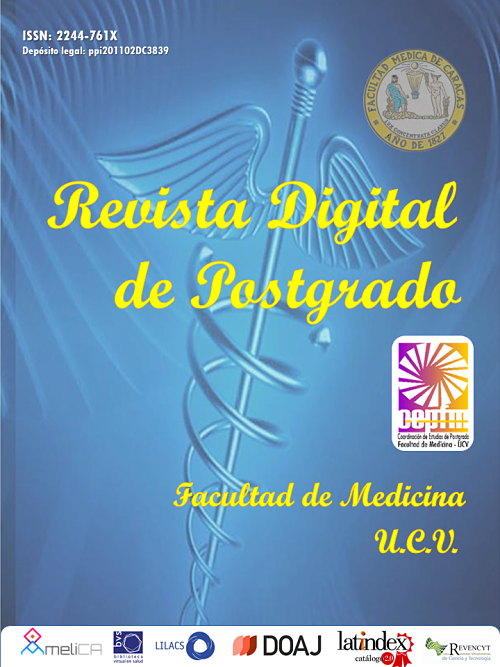Simulación basada en aprendizaje experiencial en la educación en diabetes para promover la empatía hacia el paciente
DOI:
https://doi.org/10.37910/RDP.2024.13.3.e404Palabras clave:
Empatía, Diabetes Mellitus, SimulaciónResumen
Método: La undécima cohorte del Diplomado se distribuyó en cuatro grupos y a cada participante se le pidió que se fijara una meta de actividad física a alcanzar en un mes, así como dar apoyo a sus compañeros en su esfuerzo individual. Toda la interacción dentro del grupo se llevó a cabo de manera virtual. Al final de la actividad, se les pidió que escribieran una reflexión sobre la experiencia. Se trató de una investigación aplicada de tipo cualitativo en el cual se realizó un muestreo por conveniencia y todas las reflexiones fueron analizadas cualitativamente, utilizando un análisis de contenido convencional que permitió la creación de categorías y subcategorías. Resultados: Se distinguen 4 categorías: 1) Impacto personal (3 subcategorías), 2) Reforzamiento por el grupo, 3) Empatía hacia los pacientes y 4) Conocimiento práctico (2 subcategorías). Conclusión: El análisis de las reflexiones de los participantes mostró que se involucraron emocionalmente en la actividad, lo que los llevó a comprender de manera empática las dificultades que experimentan los pacientes con diabetes al intentar cambiar sus hábitos. Además, la experiencia los llevó a sugerir formas de superar estas dificultades, consecuencia de las que ellos mismos pusieron en práctica sobre las suyas.
Descargas
Citas
Organización Mundial de la Salud. Informe mundial sobre la diabetes. Ginebra; 2016.
Contreras F, Fernández M, Camarillo HFC, Salgueiro DC, Velasco M. Epidemiology of type 2 diabetes mellitus in Venezuela, 2010-2020. Gac Med Caracas. 2020;128(3):318–23.
Contreras F, Hernández C, Hernández P, Díaz L. Diseño e implementación de un Diplomado en Educación Terapéutica en Diabetes (ETD) dirigido a profesionales de la salud en Venezuela. Vitae. 2015;(64).
Chatterjee S, Davies MJ, Heller S, Speight J, Snoek FJ, Khunti K. Diabetes structured self-management education programmes: a narrative review and current innovations. Lancet Diabetes Endocrinol [Internet]. 2018 Feb 1 [cited 2024 Jun 11];6(2):130–42. Available from: https://pubmed.ncbi.nlm.nih.gov/28970034/
Deakin TA, Cade JE, Williams R, Greenwood DC. Structured patient education: the Diabetes X-PERT Programme makes a difference. Diabetic Medicine [Internet]. 2006 Sep 1 [cited 2024 Jun 11];23(9):944–54. Available from: https://onlinelibrary.wiley.com/doi/full/10.1111/j.1464-5491.2006.01906.x
Sánchez M del R, Contreras FO. Uso de WhatsApp y OneNote®de Office®para superar dificultades de acceso al Aula Virtual de Diplomado de Educación Terapéutica en Diabetes. Innovación, Virtualización y Desafíos en la Sociedad Digital. 2018
Azmiardi A, Murti B, Febrinasari RP, Tamtomo DG. The effect of peer support in diabetes self-management education on glycemic control in patients with type 2 diabetes: a systematic review and meta-analysis. Epidemiol Health [Internet]. 2021 [cited 2024 Feb 26];43. Available from: /pmc/articles/PMC8920738/
Johansen MY, Macdonald CS, Hansen KB, Karstoft K, Christensen R, Pedersen M, et al. Effect of an Intensive Lifestyle Intervention on Glycemic Control in Patients With Type 2 Diabetes: A Randomized Clinical Trial. JAMA [Internet]. 2017 Aug 8 [cited 2024 Jun 3];318(7):637. Available from: /pmc/articles/PMC5817591/
Brown J, Alwan NA, West J, Brown S, Mckinlay CJD, Farrar D, et al. Lifestyle interventions for the treatment of women with gestational diabetes. Cochrane Database of Systematic Reviews [Internet]. 2017 May 4 [cited 2024 Jun 3];2017(5). Available from: https://www.cochranelibrary.com/cdsr/doi/10.1002/14651858.CD011970.pub2/full
Smith AG, Russell J, Feldman EL, Goldstein J, Peltier A, Smith S, et al. Lifestyle Intervention for Pre-Diabetic Neuropathy. Diabetes Care [Internet]. 2006 Jun 1 [cited 2024 Jun 3];29(6):1294–9. Available from: https://dx.doi.org/10.2337/dc06-0224
Committee ADAPP. 5. Facilitating Positive Health Behaviors and Well-being to Improve Health Outcomes: Standards of Care in Diabetes—2024. Diabetes Care [Internet]. 2024 Jan 1 [cited 2024 Jul 9];47(Supplement_1):S77–110. Available from: https://dx.doi.org/10.2337/dc24-S005
Rodríguez Pech J, Alamilla Morejón P, Rodríguez Pech J, Alamilla Morejón P. La complejidad del conocimiento profesional docente y la formación del conocimiento práctico del profesorado. Actualidades Investigativas en Educación [Internet]. 2018 May 1 [cited 2024 Aug 15];18(2):434–58. Available from: http://www.scielo.sa.cr/scielo.php?script=sci_arttext&pid=S140947032018000200434&lng=en&nrm=iso&tlng=es
Schön DA. La formación de profesionales reflexivos: hacia un nuevo diseño de la enseñanza y el aprendizaje en las profesiones. Paidós; 1992.
Anderson K, Gupta S, Nava Buenfil F, Verrinder G. Using experiential learning and authentic assessments to support students to become competent health promotion practitioners. Health Promot J Austr [Internet]. 2022 Oct 1 [cited 2024 Mar 11];33 Suppl 1(Suppl 1):27–34. Available from: https://pubmed.ncbi.nlm.nih.gov/35989494/
Le KDR. Principles of Effective Simulation-Based Teaching Sessions in Medical Education: A Narrative Review. Cureus [Internet]. 2023 Nov 21 [cited 2024 Mar 2];15(11). Available from: https://pubmed.ncbi.nlm.nih.gov/38130558/
Boud D, Walker D. Promoting reflection in professional courses: The challenge of context. Studies in Higher Education [Internet]. 1998 [cited 2024 Mar 11];23(2):191–206. Available from: https://www.tandfonline.com/doi/abs/10.1080/03075079812331380384
World Health Organization. Directrices de la OMS sobre actividad física y hábitos sedentarios: de un vistazo. World Health Organization; 2022.
Moser A, Korstjens I. Series: Practical guidance to qualitative research. Part 3: Sampling, data collection and analysis. European Journal of General Practice [Internet]. 2018 Jan 1 [cited 2024 Feb 25];24(1):9–18. Available from: https://www.tandfonline.com/action/journalInformation?journalCode=igen20
Bengtsson M. How to plan and perform a qualitative study using content analysis. NursingPlus Open. 2016 Jan 1;2:8–14.
Hsieh HF, Shannon SE. Three approaches to qualitative content analysis. Qual Health Res. 2005;15(9):1277–88.
Schmidt SK, Hemmestad L, Macdonald CS, Langberg H, Valentiner LS. Motivation and Barriers to Maintaining Lifestyle Changes in Patients with Type 2 Diabetes after an Intensive Lifestyle Intervention (The U-TURN Trial): A Longitudinal Qualitative Study. International Journal of Environmental Research and Public Health 2020, Vol 17, Page 7454 [Internet]. 2020 Oct 13 [cited 2024 Feb 25];17(20):7454. Available from: https://www.mdpi.com/1660-4601/17/20/7454/htm
Wake AD. Protective effects of physical activity against health risks associated with type 1 diabetes: “Health benefits outweigh the risks.” World J Diabetes [Internet]. 2022 Mar 3 [cited 2024 Jun 4];13(3):161. Available from: /pmc/articles/PMC8984568/
Kirwan JP, Sacks J, Nieuwoudt S. The essential role of exercise in the management of type 2 diabetes. Cleve Clin J Med [Internet]. 2017 Jul 1 [cited 2024 Jun 4];84(7 Suppl 1):S15. Available from: /pmc/articles/PMC5846677/
Alexandre K, Campbell J, Bugnon M, Henry C, Schaub C, Serex M, et al. Factors influencing diabetes self-management in adults: an umbrella review of systematic reviews. JBI Evid Synth [Internet]. 2021 May 18 [cited 2023 Jun 13];19(5):1003–118. Available from: https://pubmed.ncbi.nlm.nih.gov/33741836/
Yardley S, Teunissen PW, Dornan T. Experiential learning: Transforming theory into practice. Med Teach [Internet]. 2012 Feb [cited 2024 Mar 17];34(2):161–4. Available from: https://www.tandfonline.com/doi/abs/10.3109/0142159X.2012.643264
Vorderstrasse AA, Melkus GD, Pan W, Lewinski AA, Johnson CM. Diabetes LIVE (Learning in Virtual Environments): Testing the Efficacy of Self-Management Training and Support in Virtual Environments (RCT Protocol). Nurs Res [Internet]. 2015 Oct 27 [cited 2024 Aug 18];64(6):485. Available from: /pmc/articles/PMC4624251/
Nikpour S, Atlasi R, Sanjari M, Aalaa M, Heshmat R, Mafinejad MK, et al. Extracting virtual modules of diabetes courses for training primary health care professionals: a scoping review. J Diabetes Metab Disord [Internet]. 2023 Jun 1 [cited 2024 Aug 18];22(1):73. Available from: /pmc/articles/PMC10225411/
Whitley HP. Active-Learning Diabetes Simulation in an Advanced Pharmacy Practice Experience to Develop Patient Empathy. Am J Pharm Educ [Internet]. 2012 Dec 12 [cited 2024 Mar 3];76(10). Available from: /pmc/articles/PMC3530065/
Parker D, Fontem A, Ojong E, Pope J. Impact of Diabetes Simulation on Empathy in Pharmacy Students. Am J Pharm Educ [Internet]. 2019 Feb 1 [cited 2024 Mar 3];83(1):69–72. Available from: /pmc/articles/PMC6418853/
Donegan D, Mader R, Weigel S, Kennel KA. Newly Diagnosed T ype 1 Diabetes Mellitus: A Resident Simulation. MedEdPORTAL [Internet]. 2013 Feb 20 [cited 2024 Mar 3]; Available from: https://www.mededportal.org/doi/10.15766/mep_2374-8265.9345
Descargas
Publicado
Cómo citar
Número
Sección
Licencia
Derechos de autor 2024 María Sánchez, Freddy Contreras

Esta obra está bajo una licencia internacional Creative Commons Atribución 4.0.
Usted es libre de:
- Compartir — copiar y redistribuir el material en cualquier medio o formato
- Adaptar — remezclar, transformar y construir a partir del material
- para cualquier propósito, incluso comercialmente.
Bajo los siguientes términos:
-
Atribución — Usted debe dar crédito de manera adecuada, brindar un enlace a la licencia, e indicar si se han realizado cambios. Puede hacerlo en cualquier forma razonable, pero no de forma tal que sugiera que usted o su uso tienen el apoyo de la licenciante.
- No hay restricciones adicionales — No puede aplicar términos legales ni medidas tecnológicas que restrinjan legalmente a otras a hacer cualquier uso permitido por la licencia.












